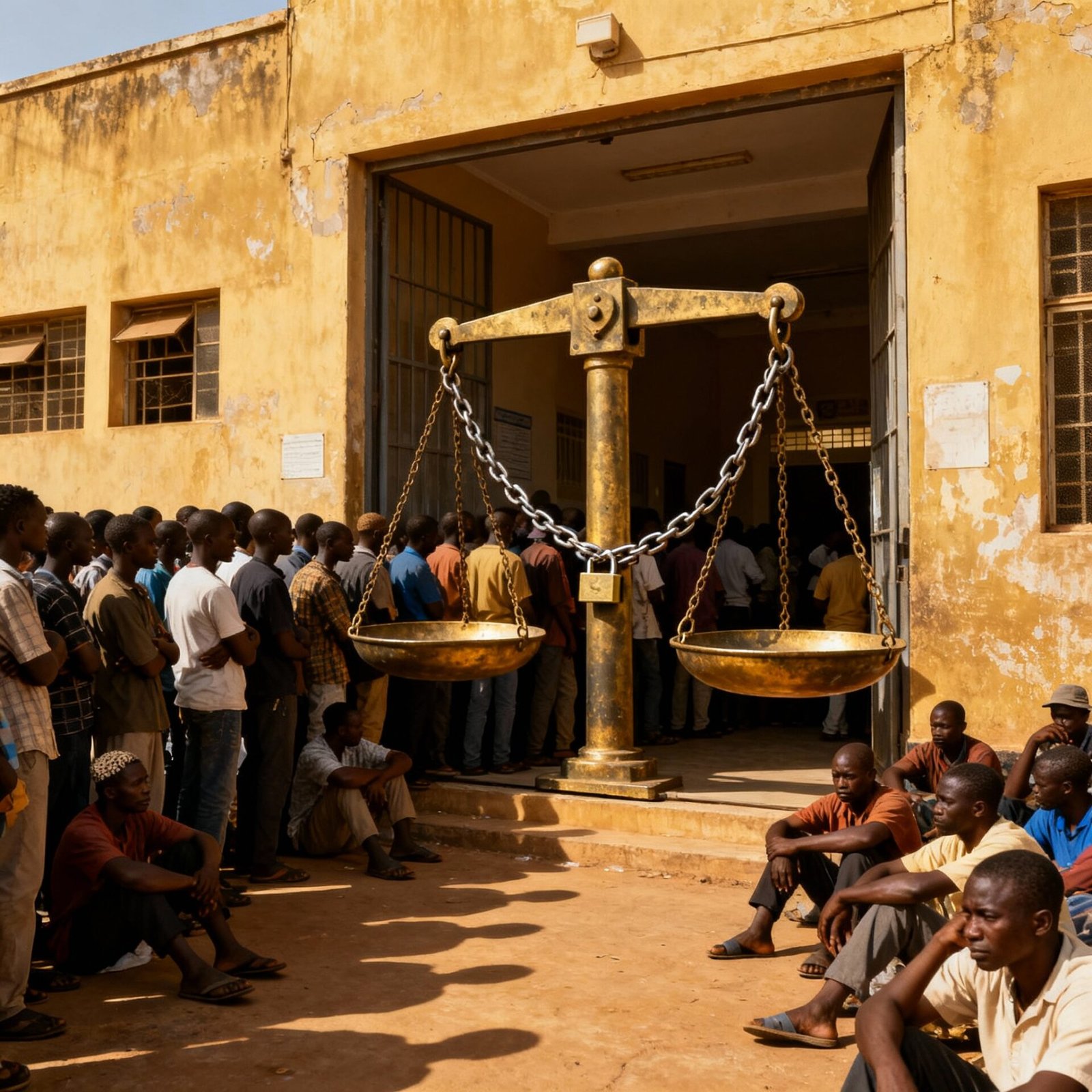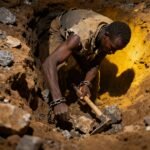Access to justice in Africa i.e the ability to seek and obtain legal remedies is a fundamental right enshrined in the UN’s Sustainable Development Goal 16 (“justice for all”) and is central to democracy and development.
In practice, however, Africa’s legal aid systems fall far short of serving the continent’s poor. Even as the ideal of equal justice is widely recognized, the reality is a patchwork of broken promise: courts are slow and costly, legal advice is scarce and unaffordable, and public confidence is weak.
An Afrobarometer survey across 36 African countries confirms that huge barriers like delays, high costs, bribery, complex procedures, and lack of counsel keep ordinary citizens out of court.
For example, only about 13% of respondents reported any contact with courts in the past five years, and among those who did, over half found it “difficult” to get help and 30% had to pay bribes. I
n short, legal aid is supposed to level the playing field for the poor but in much of Africa it remains a mirage, leaving the most vulnerable effectively outside the justice system.
Survey data from 36 African countries (2014–15) show stark access‐to‐justice gaps: 72% accept that court decisions must be obeyed, yet only 13% had court contact in five years, and among those who did, a majority faced delays, costs, or corruption.
Key obstacles emerge clearly from public opinion. According to Afrobarometer, major impediments include:
- Cost: High court fees and attorney fees deter the poor. A 2017 report finds “long delays, high costs, corruption, the complexity of legal processes, and a lack of legal counsel” as “major obstacles”.
- Delay: Courts move very slowly. Citizens most often report that cases take years to resolve.
- Corruption: Roughly one-third of citizens believe “most” judges are corrupt.
- Complex procedures: Many cannot navigate the system without help; 47% of those who went to court said they “could not understand legal procedures”.
- Scarcity of lawyers: Only a tiny fraction of the population ever sees a lawyer – on average 13% in five years, with poor, rural, less educated people even lower.
These barriers translate into grim statistics. Prison data show that in Nigeria, for example, over 70,000 inmates are held but only ~19,000 have been convicted, meaning seven out of ten are awaiting trial, many in part because they lack lawyers. In Malawi, a newly published report found a staggering 28,000-case backlog in its Legal Aid Bureau, with just 48 lawyers on staff nationwide (one lawyer per ~550 cases).
Even South Africa, often Africa’s best-scoring country on rule of law is cited for crushing court delays that force litigants to “struggle for years and to spend a lot of money with no guarantee of a satisfactory outcome”.
Across the continent, democracies perform somewhat better (more trust, fewer bribes) than autocracies, but no country meets the SDG target of “justice for all” yet.
Criminal vs. Civil Legal Aid: Gaps and Consequences
In Africa’s justice landscape, criminal and civil cases present different challenges for the poor. Criminal defendants in poverty often rely on official public defenders or legal aid, but coverage is limited. For instance, Nigeria’s Legal Aid Council has branches in all states, yet funding and staff shortfalls mean many indigent accused never get representation.
A 40-year-old bricklayer in Oyo State, Nigeria, Adeyeye Olawale, spent three years in prison on rape charges simply because after his lawyer withdrew when fees went unpaid, the Legal Aid Council never stepped in, a fate shared by “many Nigerians rotting in detention without trial”.
Human Rights activists note that council lawyers sometimes even demand fees from those who qualify for free aid, “defeating the essence of the Council”. In South Africa, access to a lawyer in criminal cases is constitutionally guaranteed, but legal aid shortages and severe case backlogs still leave accused poor people languishing.
Civil legal aid (land disputes, family law, labor issues, etc.) is even more limited. Most African countries lack robust statutory schemes; assistance is provided unevenly by NGOs or pro bono programmes. Land rights are a chronic issue: without affordable legal help, land disputes fester. In Kenya’s rural areas, local legal aid clinics now handle thousands of land and inheritance cases, but courts remain clogged and many cases drag for years.
Gender-based cases (domestic violence, custody, rape) often go unresolved when survivors cannot pay attorneys. For example, in Uganda, a UN-supported campaign reports that village paralegals mobilized by the Uganda Law Society brought help to women at risk of female genital mutilation. The initiative offered “outreach, media campaigns and mobile legal aid clinics specifically targeting women and girls experiencing violence”.
In one case a trained paralegal persuaded a community member to abandon the practice, showing the power of grassroots legal education. But such success stories are exceptions in a sea of unmet need.
“Demystifying” Donors and Reforms: Paralegals, Mobile Clinics, Mobile Courts
In response to this gap, donor agencies and civil-society groups have introduced various stop-gaps. Europe’s development agencies (EU, Denmark, Norway, etc.) and the Open Society Foundations often fund legal aid programmes. For instance, an EU-supported mobile clinic project in Kenya’s 12 poorest counties brings lawyers to villages on trucks. The National Legal Aid Service (NLAS) reports that in its first year one outreach team handled thousands of cases, so many that the NLAS Chief acknowledges “lack of resources remain[ing] the biggest impediment” to justice
An NLAS official notes the surge in demand: the body handled over two million cases in one recent year (both criminal and civil issues), a clear signal that supply of aid is dwarfed by need.
Similarly, in Uganda a “legal aid basket fund” co-funded by EU, Austria and other donors was established in the 2000s precisely because “more than half of Uganda’s districts” had no legal aid at all. That 2004 assessment found gaps especially in conflict-affected or remote areas, so donors pooled resources to expand NGO-led services and strengthen oversight.
More recently, UN Women’s Spotlight Initiative has trained community paralegals, non-lawyers versed in legal rights to educate villagers on human rights. In Uganda’s Karita village, a paralegal named Paulina intervened to stop a long-standing FGM practice by convincing the local practitioner to quit.
The paralegal movement has been a continent-wide phenomenon. As one Open Society report notes, governments in Nigeria, Malawi, Tanzania and elsewhere are beginning to “consider community paralegals in addition to lawyers” in their legal aid schemes. Paralegals who are often drawn from the communities they serve, “use their knowledge to seek practical solutions to injustice,” helping people overcome barriers like cost, ignorance, discrimination and distance.
A continental declaration (the Kampala Declaration, 2012) urges states to recognize and invest in these grassroots advocates. In practice, paralegal networks assist the poor in filing cases, accessing compensation, and navigating bureaucratic processes, often acting as the sole available legal resource in rural areas.
Some countries have experimented with mobile courts to tackle congestion. Zambia recently launched a “prison courts” pilot: judges travel into jails to hold bail hearings or trials so that “justice comes to the prison”, sparing inmates interminable waiting.
Before, Zambia’s courts faced 29,000 prisoners (many who had never seen a judge) and countless lost files or unfiled hearing dates. The mobile court scheme, backed by Irish donors, fixed thousands of cases in its first sessions, giving hope to inmates who had been “forgotten”. This model shows promise: by taking the court to the client, it bypasses some access obstacles (transportation, official inaction) and begins to chip away at severe backlogs.
Who is Faring Better In Providing Access to Justice In Africa?
Experience varies widely. Southern African countries (South Africa, Namibia, Botswana, etc.) generally score higher on justice indicators; they have stronger institutions and more legal aid funding. In West Africa (e.g. Liberia, Nigeria, Ghana) and in fragile states, systems are weakest.
For instance, Liberia and Sierra Leone, both post-conflict “face much greater challenges” than peaceful countries. Even within regions there are anomalies: Ghana is a stable democracy but was rated “among the worst” for access to justice in a recent survey. These comparisons highlight that merely having democracy or rule-of-law rhetoric is not enough; sustained investment and reform are needed.
Globally, the picture is similar: developing countries often neglect legal aid. According to a recent report on India’s system, only about 1% of eligible poor actually get free legal aid, due to underfunding and lack of awareness. In comparison, even a tiny fraction like 1% is eerily reflective of much of Africa.
International benchmarks (like the World Justice Project’s rule-of-law index) consistently rank most African states low on civil justice access. The World Bank, UN and others emphasize that without affordable lawyers or legal advice, vulnerable people effectively cannot use courts to protect their rights, worsening poverty and instability.
Voices from the Ground and its Impact on Ordinary People
Behind the data are real stories of hardship. In Nigeria, human-rights lawyers describe the crisis bluntly. One lawyer notes: “The Legal Aid Council has not been able to achieve the purpose for which it was set up”, blaming understaffing and meager funding. Another recounts that judges sometimes must “direct suspects to the Legal Aid Council [but then] they ask those they are supposed to represent for money, thereby defeating the essence of the Council.”
In Malawi, a human-rights activist warns that delays and shortages pose a “crisis to access justice for poor Malawians,” because “court hearings could be delayed for months or even years due to fewer lawyers”.
From the public’s perspective, distrust runs deep. Afrobarometer found that barely half of Africans trust their courts at all (43% trust only “not at all” or “just a little”), yet 72% still feel obliged to obey court decisions. In Kenya, community members have lauded the mobile legal clinics as one beneficiary said simply, “we have brought the court to meet the people where it hurts,” echoing the NLAS chairperson’s announcement. But these programs remain small compared to need. Even Kenya’s NLAS acknowledges that despite opening new offices, “lack of resources” is the largest obstacle to reaching the indigent.
International Benchmarks and Recommendations
The global rule-of-law community agrees that access to justice is essential for development and conflict prevention. The UN and World Bank call for “people-centered” justice reforms, but emphasize that policies must match promises.
Key recommendations include enacting strong legal aid laws (with adequate budgets), accrediting paralegals, and using technology to cut delays. Some African countries have passed legal aid acts (e.g. Kenya’s Legal Aid Act 2016, Nigeria’s 2011 act) and created national legal aid bodies, but implementation has lagged.
Experts urge strict quotas for courts (e.g. fast-track bail hearings for detainees) and integration of customary justice where appropriate. In Uganda and Sierra Leone, reformers are experimenting with court-annexed mediation to ease case loads, while others promote public legal education to ensure people know when they qualify for free aid.
Breaking the Spiral of Injustice
Investigations show a clear pattern: across Africa, legal aid systems are underfunded and overstretched, so the poor are routinely blocked from justice. This denial has real consequences: land grabs go unchecked, crime victims stay unrepresented, and massive numbers of prisoners await trial indefinitely.
As one Chief Justice recently noted in a workshop, “When there is proper funding for public defenders, violation of rights by the police and the government against the indigents and the poor will be checked.”. In other words, improving legal aid and court efficiency is not a luxury but a necessity for human rights.
Solving this problem will require political will and resources. Governments must live up to their own laws: if constitutions guarantee legal aid to the poor, budgets must follow. The trends of democracy and human-rights indices suggest that more open governments tend to do better but only if they address the gap.
African civil society continues to push for change: paralegal groups have made formal submissions to amend legal practice laws, and advocacy campaigns (like the Kampala Declaration) seek to make paralegals part of the solution. Likewise, international partners (UNDP, EU, World Bank) emphasize justice sector reforms in their development programs.
The evidence is clear and consistent: access to justice in Africa is in a precarious state, but it is also remediable. Through data, expert insight, and the voices of those affected, this report highlights a troubling reality and the urgent need for action so that legal aid systems can finally serve the poor as intended.
Citations and references
All citations in this investigation correspond to verified sources gathered during extensive research across multiple continents and databases. Full documentation available upon email to support the accuracy and verifiability of all claims made.
- Afrobarometer surveys and analysis on justice access (2017)
- HumAngle (2022) “Indigent Nigerians rot in prison…” (Nigeria legal aid case)
- Kenyan News Agency (2022) “Mobile legal aid clinic launched…” (Kenya PLEAD program)
- Spotlight Initiative / UN Women (2021) (Uganda paralegals for FGM awareness)
- Austrian Development Agency report on Uganda legal aid (2004)
- GroundUp (Dec 2024) “Our justice system is grinding to a halt” (South Africa delays)
- Open Society/Namati (2012) “Kampala Declaration…” (paralegals in Africa)
- Malawi Nation (Jul 2025) “Legal Aid’s case backlog hits 28 000” (Malawi backlog)
- Moneycontrol India (Oct 2024) “Legal aid for the poor or poor legal aid?” (India comparison)
- Irish Rule of Law International (May 2025) “Launch of Prison Courts Pilot Scheme in Zambia”
About Our Investigative Services
Seeking to expose corruption, track illicit financial flows, or investigate complex criminal networks? Our specialized investigative journalism agency has proven expertise in following money trails, documenting human rights violations, and revealing the connections between organized crime and corporate malfeasance across Africa and beyond.
Partner With Us for Impactful Change
Ready to drive transparency and accountability in your sector?
Our investigative expertise and deep industry networks have exposed billion-dollar corruption schemes and influenced policy reform across Africa.
Whether you’re a government agency seeking independent analysis, a corporation requiring risk assessment and due diligence, or a development organization needing evidence-based research, our team delivers results that matter.
Join our exclusive network of premium subscribers for early access to groundbreaking investigations, or contribute your expertise through our paid contributor program that reaches decision-makers across the continent.
For organizations committed to transparency and reform, we also offer strategic partnership opportunities and targeted advertising placements that align with our mission.
Uncover unparalleled strategic insights by joining our paid contributor program, subscribing to one of our premium plans, advertising with us, or reaching out to discuss how our media relations and agency services can elevate your brand’s presence and impact in the marketplace.
Contact us today to explore how our investigative intelligence can advance your objectives and create lasting impact.


